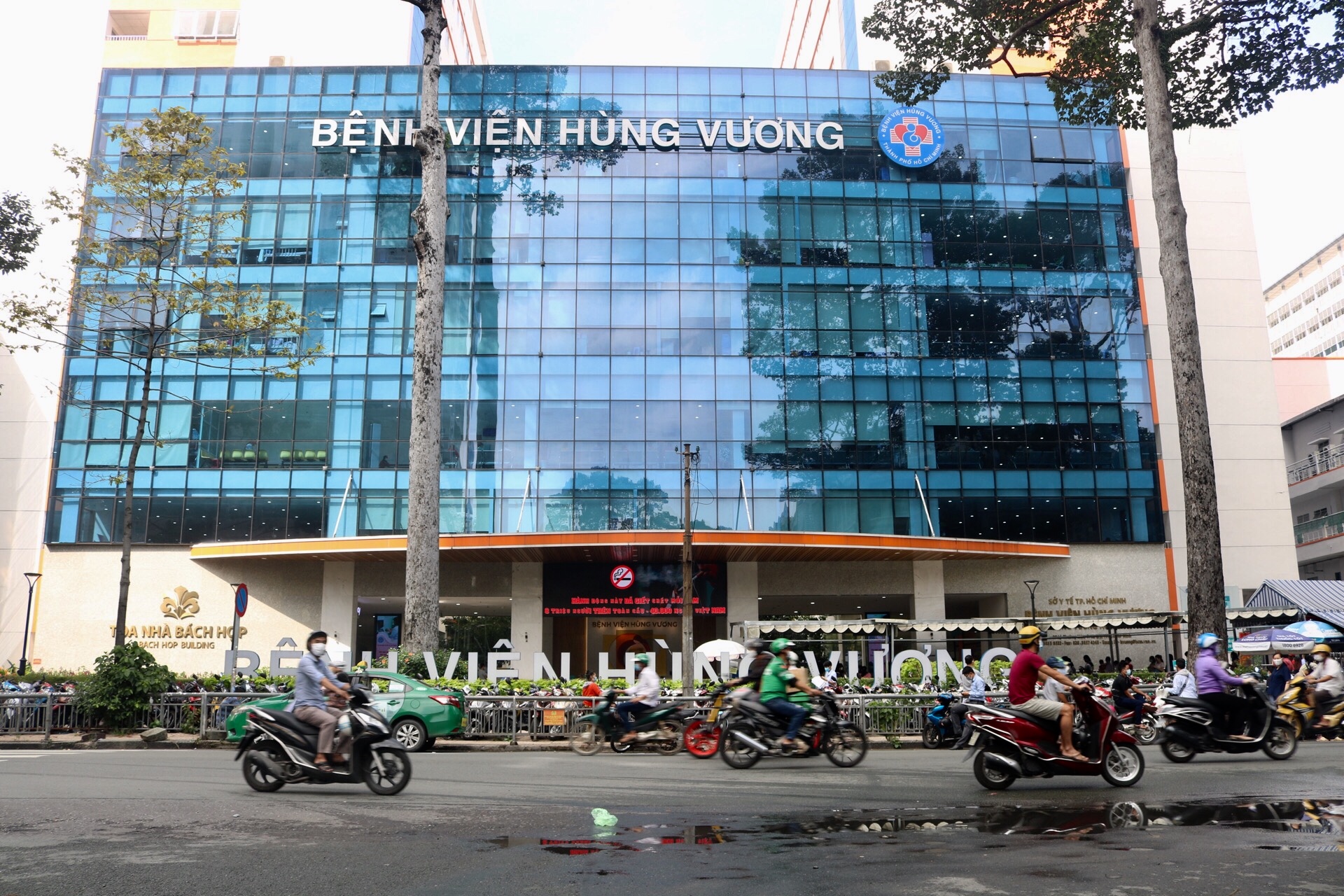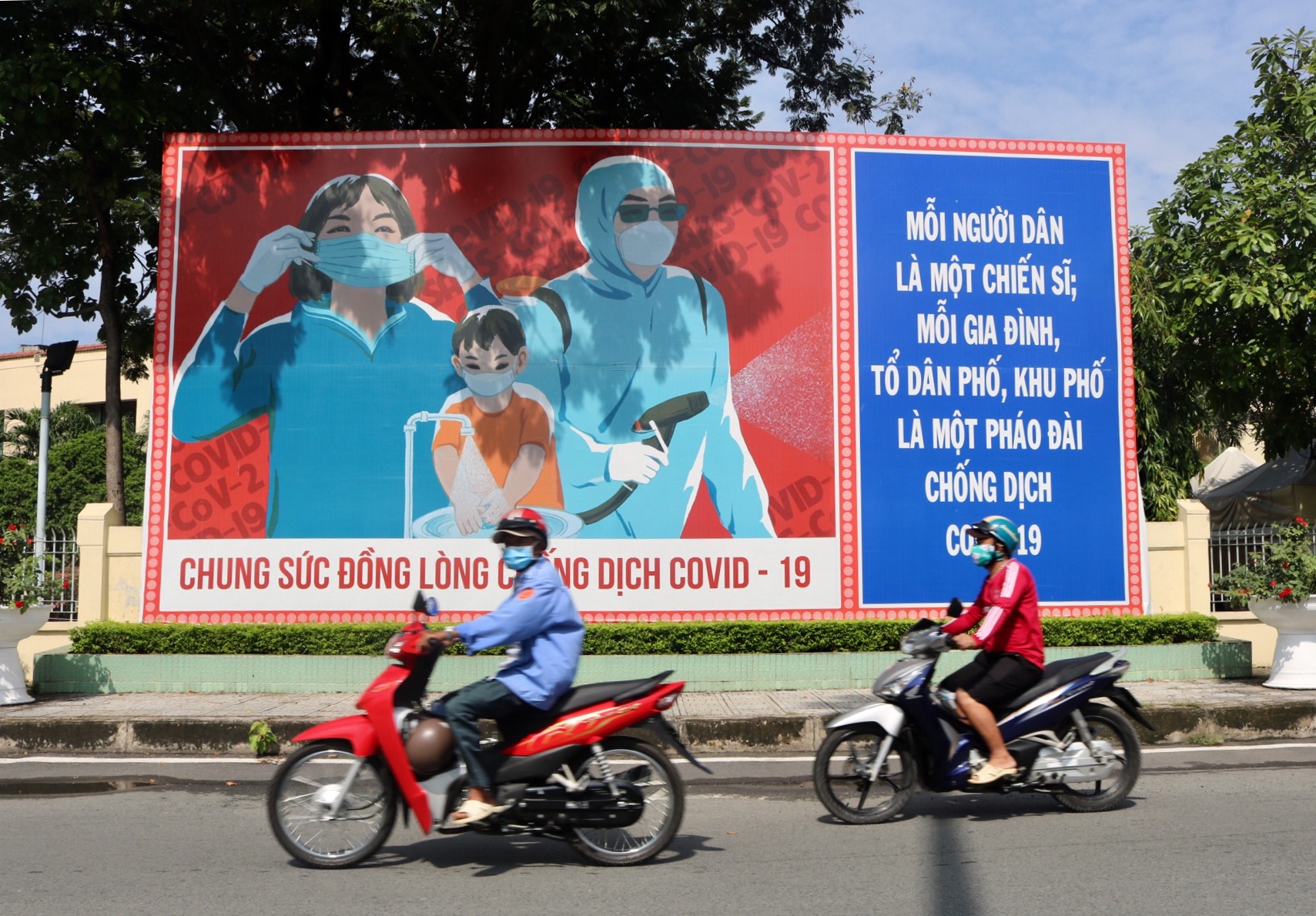Nguyen Dao spent the peak of Vietnam’s fourth wave of Covid-19 volunteering at ‘field hospital No. four’ in the country’s epicentre of the disease, Ho Chi Minh City.
The 29 year old said the makeshift, five-storey hospital in Binh Chanh District lacked well-functioning electricity, elevators and working toilets. Staff members carried patients up and down stairs using their hands and a trolley cart. At times when the electricity failed, patients connected to ventilators died.
“Everybody was exhausted, everybody was crying because we felt like Ho Chi Minh City was ending,” Dao said. “We felt that way because you see the dead around and sometimes the power cut off and after the power turned back on in the hospital some of the people couldn’t breathe and we couldn’t save them.”
During the fourth virus wave, which began at the end of April with the arrival of the Delta variant, approximately 117,300 medical staff worked on the frontlines of the pandemic. The majority of healthcare workers centred in the country’s hardest-hit locale, Ho Chi Minh City, and surrounding southern provinces.
Despite the harsh realities of the job and the extended hours spent fighting Covid-19, some believe healthcare workers have not received sufficient benefits, equipment, training and mental health services. Instead of this support, on 6 September the Ministry of Health threatened to pull the medical license of anyone who quit their job during the pandemic.
As the outbreak worsened, doctors, nurses and volunteers were under extreme pressure as the medical system became overwhelmed by the flood of positive cases and patients in critical condition. It was not uncommon for one doctor to be responsible for 150 patients and up to extreme case loads of 1,000.
Dr Quan The Dan was one of 16,000 medics who headed from northern and central regions of the country to fight the disease in the South. Healthcare workers needed support during these hard times, not intimidation, he said.
“I consider the decision to threaten to withdraw the license to practise as insensitive,” Dan said. “Times of stress need support and encouragement, not threats.”

By the end of May, Vietnam’s fourth wave of Covid-19 hit the South and Ho Chi Minh City soon became the epicentre of the disease. On 2 June, a 37-year-old woman became the city’s first Covid-19 fatality. In the four months since, the city has logged more than 16,000 deaths, making up 80% of the country’s death toll.
“The biggest challenge was that the epidemic moved too quickly and was too severe. The people and the government were taken by surprise. The second was that the health sector was quickly overloaded,” said Dan, who worked eight to 14 hours per day at a field hospital in Binh Duong Province from 21 August to 30 September.
In addition to a medical staff shortage, as Dan explained, additional difficulties resulted from productivity being slowed by cumbersome personal protective gear and by many medics lacking specialisation in respiratory diseases.
“When wearing protective gear, the work productivity decreased,” he said. “These medical staff are from many different specialties and are not proficient in emergency resuscitation skills.”
Today, more than 77% of Ho Chi Minh City residents have received two doses of a Covid-19 vaccine while nationwide 18.5% of the population is fully vaccinated. On 19 October, Ho Chi Minh City logged less than 1,000 new positive cases and 47 deaths. At the beginning of September the city experienced an all-time high of 8,499 cases and during the worst of the outbreak there were well over 200 deaths per day.
“The situation is much better now than when I first entered. Hospital admissions decreased sharply, severe cases also decreased significantly,” Dan said, adding that medicine and equipment are also more widely available.
On 1 October, the city ended its strictest lockdown that went into effect on 23 August. During the stay-at-home order, citizens were barred from leaving their homes even to get food.
As the situation improves, the operation of 16 field hospitals set up across the city to deal with the influx of patients is being phased out.
Dao, the medical volunteer, has transferred to support the city’s vaccination team as case numbers and deaths have trended down in the city. However, his experience at field hospital No. four and the plight of doctors and nurses during the outbreak has been hard to forget.
The makeshift hospital in an abandoned building where Dao volunteered was set up to house 4,000 patients with asymptomatic cases of Covid-19. However, during the period that he described as the worst time at the hospital – mid-August to the beginning of September – they were unable to transfer anyone to ICUs and had to treat patients in critical condition.
Once the hospital had filled its 4,000-person capacity, it took in 86 more patients, putting extra beds in the hallways. Despite accepting more patients, the facility still had hundreds of calls per day from people who couldn’t find a hospital taking new patients.
“Every day a thousand people would call our hotline and say, ‘Please help, please help,’ because no hospital in Ho Chi Minh City at this time would accept them,” Dao said.
At field hospital No. four, some of the patients’ symptoms became severe and they lacked doctors with Covid-19 expertise or sufficient protective gear and medical equipment. The staff reused N95 masks, spraying them with alcohol or leaving them under the sun or a UV light in an attempt at sterilisation.
“We needed more machines and more techniques in order to save their lives but in the field hospital the main purpose is only for the patients without heavy symptoms,” Dao said. “They needed more treatments, better doctors, ICUs and things like that but in the field hospital we couldn’t transfer any patients.”
As field hospital staff shifted to operate as an ICU, Dao saw the impact on healthcare workers; all were exhausted, many hadn’t seen their families for months and some struggled with patient deaths.
“So many people died per day that they couldn’t believe that. They just left a patient for five minutes to go to another patient and when they came back they were already dead. Some people died in silence because [there was] not enough medical staff support at that time and not enough machines.”
Healthcare workers at field hospitals were far from the only group of medics struggling during the city’s outbreak. A 50-minute documentary aired on 8 September on the state-run television channel VTV1 depicted the maternity ward of Hung Vuong Hospital, the city’s second-largest obstetrics and gynecological specialty hospital.
The film, Ranh giới, or Boundaries, shows patients begging doctors to let them die at home, a pregnant woman falling and turning blue, and medical staff drilling holes in the wall for oxygen cables, running out of sedatives and oxygen monitors, sleeping in hallways and expressing grief at being unable to save patients lives.

Although the health ministry’s September threat to revoke the licenses of healthcare personnel who quit is not legally binding, and pointedly stated doctors and nurses should be praised and receive unspecified rewards, the document did not sit right with many in the medical field. Especially as some staff have not seen their salaries increase despite the additional hours and dangers of fighting Covid-19, while others noted a decrease in wages.
Dan, the doctor in Binh Duong, was not opposed to giving up his monthly salary to fight the pandemic in the South and noted that he and other medics received an anti-epidemic allowance of a few million Vietnamese dong, about $88.
“Our salary is still the same as before the epidemic. Therefore, compared to the effort spent, it is considered as a decrease,” he said. “As for me and a few others who are volunteer doctors, we work without pay.”
Dao in Ho Chi Minh City worried about the burden on doctors and nurses who believe the Ministry of Health’s threats remove the option of participating in Covid-19 patient treatment.
“I feel they won’t have a chance to choose, they have to fight. They cannot quit the job at that time because I heard that if they quit the job the government would take their certificate back,” Dao said.
Quach Minh, a sixth-year medical student, began collecting samples and helping with vaccinations in Binh Tan District in June when the government called for medical students to volunteer.
“All the medical staff do not agree with that and they’ve shown their opinion. I think that is maybe a wrong step and it discourages our mental health somehow,” he said.
A study released this month on healthcare workers’ emotions, stressors, and coping mechanisms in Vietnam during the pandemic concluded that medical staff are in urgent need of psychological support. The study included a two-week survey in March and April of 2020, in a much less severe period of the pandemic in Vietnam. Of the 1,423 participants, 86% felt nervous or scared, the vast majority, 90%, believed special recognition was needed and more than 80% said additional compensation was necessary.
The deputy director of the University Medical Center in Ho Chi Minh City, which conducted the study, declined to comment on the health ministry’s statement about revoking medical licenses or to discuss medical workers’ salaries.
Minh, the medical student, said the government seems to be threatening practitioners or flexing its power “instead of encouraging healthcare staff.”
“When we participate in fighting Covid we face the risk of contracting the disease. And also we are getting tired with an unsure future or promotion in that area, but participate in this anyway to help the people and also the government to get through this pandemic,” Minh said. “I really can’t speak for all the medical staff but I can say that we really do want to have more support.”


